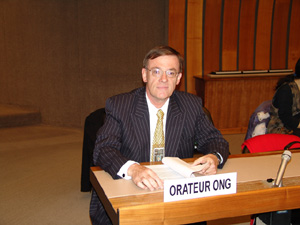Having come in for much criticism of late for its lack of effectiveness and credibility, the United Nations Commission on Human Rights (UNCHR) seems set for reform.
At an open meeting on March 30 attended by Mrs. Louise Arbour, High Commissioner for Human Rights, the whole issue of reform was raised and debated by members of civil society, including representatives of the protestant mainstream Seventh-day Adventist Church.
In her remarks, Arbour said she wanted to "conceive of a body that will work universally and fairly for the implementation of human rights," and that there was a great "need to re-center the core of our work in this new environment. We want to see where we will be in ten years, and not be held back by the liabilities of the past. In general terms the emphasis is less on the normative phase, and more on equipping for the implementation phase of human rights—which is very dysfunctional as it is currently operating. It is a challenge for our office and for states parties."
Dr. Jonathan Gallagher, UN representative for the Adventist Church, posed what many see as the crucial question — who will make up the reformed Commission or proposed new Council? He suggested that many believed there should be qualifications for membership of a body that sought to enhance human rights, and that having countries who were human rights violators on the Commission brought it into disrepute. The recent "high level panel" that was charged by UN Secretary General Kofi Annan with bringing recommendations on necessary UN reforms stated in its report that "the Commission on Human Rights suffers from a legitimacy deficit that casts doubt on the overall reputation of the United Nations."
In her response, Arbour admitted "a credibility gap and lack of legitimacy in the Commission, " adding that "this is particularly acute when states are invited to throw accusations against each other." However she was skeptical about implementing what she called suitability requirements for membership of the proposed new Human Rights Council. She suggested that the better question is "What should the Council focus on? Membership to do what? How will the work be conducted? As we look for a body which would equip itself to do peer review of implementation of all rights, done through processes which are universal, fair, and respectful, then it may matter less who constitutes the body."
Whether such a view is successful remains to be seen. The current session of the Commission on Human Rights runs from March 14 to April 22. The Seventh-day Adventist Church is making five statements to the Commission on issues of extreme importance that include religious intolerance and persecution, women’s rights, and minorities. [Editor: Jonathan Gallagher for APD]

